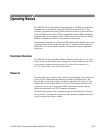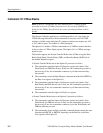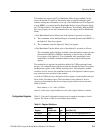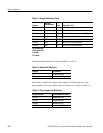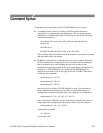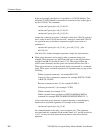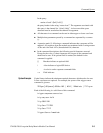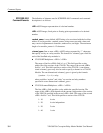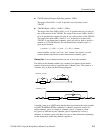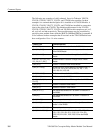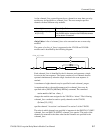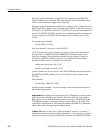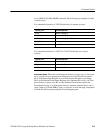
Command Syntax
3–2
VX4380 256-Crosspoint Relay Matrix Module User Manual
In the next example, the Option 01 is installed on a VX4330 Module. Two
additional VX4330 Modules are installed in consecutive slots to the right of
the first VX4330. The commands
route:configure:join m1,(1:6)<LF>
route:configure:join m2,(1:2)<LF>
route:configure:join m3,(1:4)<LF>
connect the commons of sections 1 through 6 on the first VX4330, sections 1
and 2 on the second VX4330 and sections 1 through 4 on the third VX4330.
An equivalent way to send these commands using the semi-colon as a
terminator is
route:configure:join m1,(1:6); join m2,(1:2); join
m3(1:4)<LF>
Note that <LF> in these examples represents a single line feed character.
H White space characters can be used to make a command string more
readable. These characters are ASCII-encoded bytes in the range hexadeci-
mal 00-09 and 0B-20 (decimal 0-9 and 11-32). This range includes the
ASCII control characters and the space, but excludes the line feed <NL>.
White space characters are ignored when legally encountered in a command
string. White space is allowed anywhere in a command string, except for the
following:
Within a program mnemonic ( for example RO UTE )
Around a colon (:) mnemonic separator (for example ROUTE: CLOSE
or ROUTE :CLOSE)
Between a mnemonic and a (?) (for example CLOSE ?)
Following an asterisk (*) (for example * STB?)
Within a number (for example 12 34)
Within a module name specified in a [ROUTe:]MODule[:DEFine]
command (for example ROUTE:MODULE:DEFINE RFM UX, 1).
At least one white space character is required between a command/query
header and its associated arguments. For example in the command
route:configure:join m1,(1:6)
the command header is the string “route:configure:join”. The arguments
associated with this command are the module name “m1” and the section list
“(1:6)”. At least one white space character must be sent before the first
argument.




